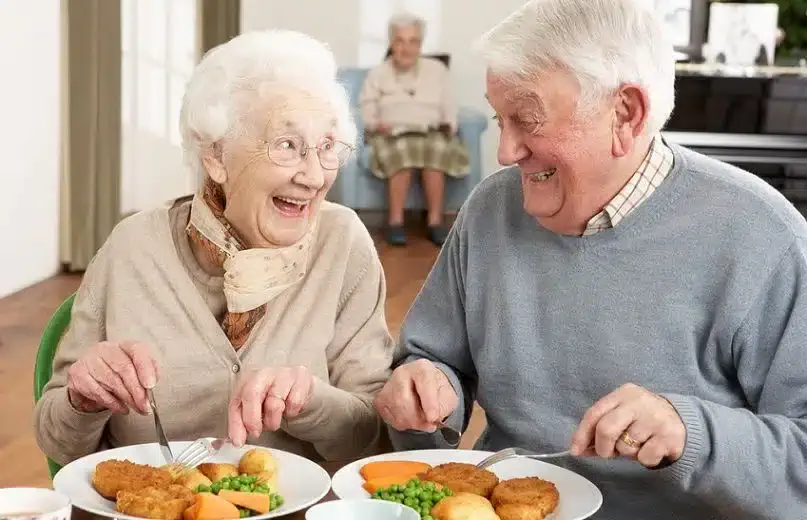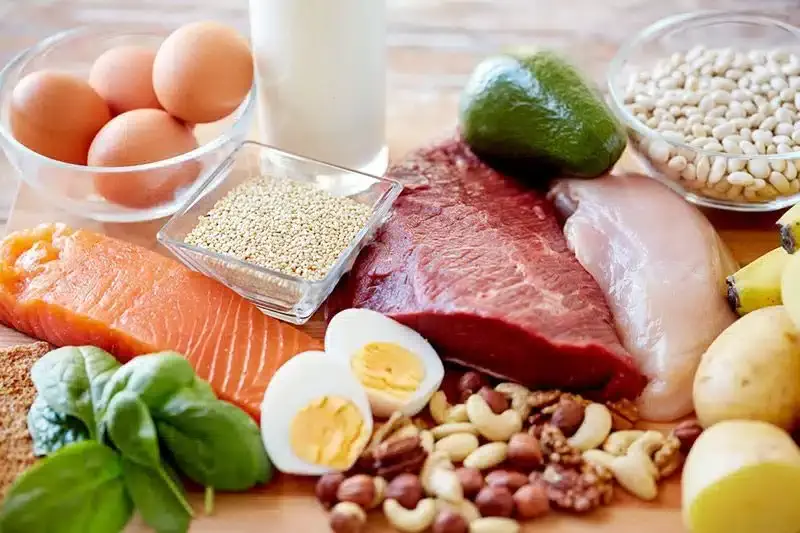
What is the Protein Intake for Elderly per day?
Do you know how much protein intake for elderly per day should be? Protein is an essential micronutrient in general. Our body, including skin, hair, nails and hemoglobin in the blood, requires adequate amounts of it to maintain healthy body function. This nutrient is necessary in all age groups, from children to adults. When we think of protein, we usually associate it with bodybuilding or weight loss. We hardly think about the other benefits it offers. b
It turns out, protein is very important for the elderly. As we age, we lose our skeletal muscle mass and strength. This is an involuntary process called sarcopenia. During aging, we not only lose our muscle mass, but we also tend to lose physical strength. Research shows that this can have adverse effects on the health of older people. Therefore, consuming high protein soft foods for elderly is very important. In this article from humanhealthmag, we will tell you how much protein seniors should consume daily.
Why is Protein Important for Seniors?
It is very important to know the amount of protein intake for elderly per day. Protein helps us in many physiological processes that are important for maintaining good health. For example, hemoglobin, which is a type of protein, helps transport blood throughout the body. Similarly, lactase and sucrase (also proteins) help digest sugar. However, the most important benefit of protein for seniors is in maintaining muscle mass and strength. Research shows that increasing protein intake can help reduce sarcopenia in seniors and help them live independently. In addition, protein is important for seniors for the following reasons:
- Protein helps keep your skin, nails, and hair healthy.
- A large part of your skin, hair, and nails are made up of a protein called keratin. Including dietary protein in your diet can help maintain your hair, skin, and nails.
- It helps you stay fit.
- Protein-rich foods are satiating and can keep seniors full for longer and prevent snacking or overeating. This helps in weight management.
- Ensures maintenance of bone health.
- Research shows that increasing protein intake in the elderly increases calcium absorption.
- Ensures maintenance of cardiovascular functions.
- Increased dietary protein intake among women shows a lower risk of ischemic heart disease.

Amount of Protein Intake for Elderly per Day + Best Protein-Rich Foods for Seniors
According to the Food and Nutrition Board, the recommended daily protein intake for seniors (age 65 and older) is 0.80 grams per kilogram per day. However, several research studies have shown a higher protein intake for seniors, ranging from 1.2 grams per kilogram to 2.0 grams per kilogram per day. Here are some of the best protein-rich foods for seniors:
- Eggs: Eggs are an excellent source of protein. In addition to protein, they contain other nutrients like choline, vitamin A, vitamin D, selenium, etc. that protect against chronic diseases. Research shows that eggs protect against sarcopenia. Eggs are on the list of foods for bone health in seniors.
- Chicken Breast: Chicken breast is a rich source of protein and can contain up to 30 grams (g) of protein per 100 grams. It is an excellent source of protein for seniors who are not vegetarians. Other chicken cuts like thighs, drumsticks, etc. are also good sources of protein.
- Sprouts: Sprouts are all good sources of protein. These plant foods are great examples of high-protein foods for seniors. They can be eaten soaked or boiled. Sprouts also provide folate, omega-3, omega-6, and other essential minerals.
- Fish: Fish is a great example of a soft, high-protein food for seniors. Although edible fish vary in protein content, it can reach 30 grams or more per 100 grams of fish. Once cooked, baked, or grilled, they are easy to chew and digest, making them an excellent source of protein for seniors.
- Almonds and other nuts: Almonds, cashews, and pistachios are good sources of protein. 100 grams of almonds contain 21 grams of protein. Almonds and other nuts are also good sources of healthy fats and help reduce the risk of heart disease. These can be added to sprout salads and other plant-based meals.
- Peanuts and Peanut Butter: Peanuts are a good source of protein and healthy fats. 100 grams of raw peanuts can contain 25 grams of protein11, making them one of the best high-protein foods for seniors. They can be eaten separately as a snack or added to meals like poha, upma, etc. Peanut butter is very popular in the health and wellness community and among athletes due to its high protein content.
- Lentils: Lentils are nutritionally rich and can contain 24 grams or more of protein in a 100-gram serving.
- Seeds: Pumpkin seeds, flax seeds, sunflower seeds, sesame seeds, chia seeds, and many other seeds contain a significant amount of protein. 100 grams of chia seeds contain 16.5 grams of protein. 100 grams of roasted pumpkin seeds contain 29.8 grams of protein14 and more. Other seeds are equally protein-rich. These seeds can be eaten as a snack or mixed into salads.
When is the Best Time to Consume Protein?
As we mentioned in the above article about protein intake for elderly per day, this food has many benefits for elderly people. Now the question is, when should you consume this amount of protein? Our general recommendation is to spread your protein intake evenly throughout the day. On average, people get most of their protein in the evening meals and the least in the morning.

Some studies also show that shifting more protein intake to breakfast can reduce hunger throughout the day and help manage our weight. Doctors also recommend consuming 15 to 30 grams of your daily protein at each meal. Protein is a vital nutrient for our body that can enable muscle and bone strength, improve our immune system, and have a positive effect on the function of our body’s cells. Likewise, we must be careful to keep our consumption at least as standard as possible throughout the day.
Consult a Doctor About Protein Intake for Elderly per Day
Elderly people who have certain problems, such as chronic diseases or kidney failure, should adjust their protein intake for elderly per day under the supervision of a doctor. In these cases, they may need to consume less protein or a specific type of protein that is more suitable for their health condition. Therefore, consulting a doctor and a nutritionist is essential to determine the exact amount of protein.
Also, to increase protein absorption and make more use of protein sources, you can use special combinations that facilitate protein digestion and absorption. For example, consuming a combination of chicken meat with legumes or dairy products with whole grains can provide the body with more complete protein. It is recommended that seniors divide their meals into small meals and consume an appropriate amount of protein in each meal. Fruits and vegetables that are rich in vitamin C and other antioxidants can help better absorb protein.
Concluding Remarks
In this article, we talked about protein intake for elderly per day. In general, protein is very important for the elderly and should be included in their diet in sufficient quantity and with appropriate quality. Considering the special needs of this age group, protein consumption can help strengthen muscles, maintain bone health, and strengthen the immune system. Paying attention to healthy protein sources, consulting with a doctor and nutritionist, and using appropriate protein products can help maintain the quality of life of the elderly.
Could you help us make this content even better? What do you love, and what can we improve? Share your thoughts below, feedback is the key to creating better content for YOU. If you also have an experience in this regard, please share it with us and others.

Frequently Asked Questions
How to Ensure a High Protein Diet for Seniors?
Caregivers and children of seniors can ensure that their seniors get high protein by following the nutritional value of their meals. Including high protein foods, such as eggs, chicken breast, etc. in the seniors’ diet is a great way to do this. In addition, caregivers can consult with the geriatric nurse, who can create a high protein diet plan based on the senior’s health conditions and ensure that the seniors receive a high protein diet.
What are the Bbenefits of Protein for Seniors?
Protein is especially important during old age and can have a huge impact on a person’s overall health. Protein helps maintain and strengthen muscles, thereby preventing muscle weakness that is common in old age. Protein also plays a role in building and maintaining bone structure and can reduce the risk of osteoporosis. In addition, protein is essential for making antibodies and strengthening the immune system, which is even more important as you age. Protein also helps repair tissues and rebuild the body in the event of injury or illness.
What is the Right Amount of Protein for Certain Health Conditions?
It is important to note that some older adults may need more protein than the usual recommended amount. This is usually the case for people with certain medical conditions (such as diabetes, heart disease, or kidney disease) or those who are more physically active. In such cases, it is important to consult a doctor or dietitian to determine the exact amount of protein needed.
